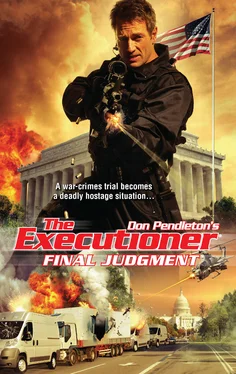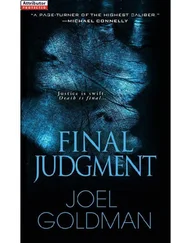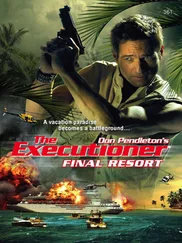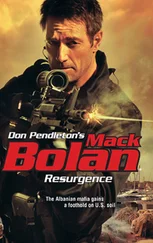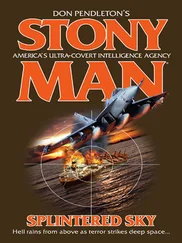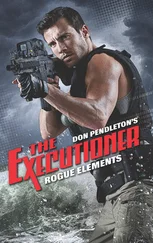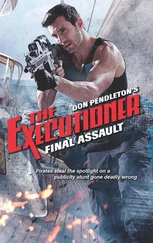“Sounds like a beautiful human being.”
“He was a monster,” Brognola said. “Rumor has it that he kept a very detailed diary, some pages of which he copied into the camp’s logs. Those logs, recovered by American forces who assaulted the camp, detail atrocities you cannot imagine, Striker.”
Bolan said nothing to that. He had seen plenty of atrocities in his endless war. He doubted there was much a human being could do to violate another that he hadn’t encountered, but the Nazis had proved extremely imaginative on that score.
“Do you recall,” Brognola said, “the Holocaust remembrance program broadcast nationally last fall?”
“I don’t get to watch a lot of television,” Bolan said.
“The program was notable,” the Fed explained, “because it featured a recorded interview with Eli Berwald. Berwald was a youth when he and his parents were imprisoned and tortured in Schlechterwald.”
“He’d have to be…”
“He’s pushing eighty,” Brognola said, “and not in the best of health. But his mind is strong, as is his passion for revenge. He said as much in the interview, which was taped only weeks before Berwald’s organization, Lantern, brought the eighty-eight-year-old Nitzche kicking and screaming from Argentina.”
“They extracted him?” Bolan asked.
“They kidnapped him,” Brognola said. “Once they had him in the U.S., their legal team jumped through a bunch of hoops. I won’t bore you with all the bureaucratic maneuvers involved. Suffice it to say they eventually had Nitzche processed through our legal system and charged with war crimes. The trial, a real televised circus, was to start today. It was going to be a message, a final blow to the last bastions of World War II. To war criminals, should any be alive and lurking out there today. Lantern has issued several press releases to that effect. Justice Has a Long Memory is their slogan.”
“They have a lot of pull for lobbyists.”
“Lantern is not simply a Jewish activist group,” Brognola said. “It borders on a vigilante organization. They are extremely militant and completely unapologetic about their activities. Much more so in recent years than in the past, but there it is.”
“Can you blame them?” Bolan asked.
“No,” Brognola said. “But that doesn’t change the complications this raises.”
“Such as?”
“Berwald’s Lantern is led primarily by his son, Eli Berwald Jr., known as Aaron to his friends and family. The elder Berwald operates in an advisory capacity, but Aaron is a firebrand. He’s run afoul of weapons charges twice, although both times, strings have been pulled behind the scenes to get him off. His father has powerful friends within the government, as you might expect. Berwald Sr. is no stranger to the games we play here in Washington.”
“And?” Bolan prompted.
“Lantern paid a celebrity bounty hunter some outrageous fee to go into Argentina and kidnap Nitzche,” Brognola said. “You probably haven’t seen the guy’s reality-television program.”
“I can’t say I have.”
“Nitzche was almost killed during the illegal extradition,” Brognola said. “Several men were injured. The bounty hunter is now wanted in Argentina, which is irrelevant, but the fact that Nitzche was guarded by armed men is what makes this complicated. These men were members of a secretive neo-Nazi group called Heil Nitzche, which Klaus Nitzche has been operating under the radar since he went to ground in Buenos Aires all those years ago. I’ve had the team at the Farm digging through the records, now that we know what to look for. The pattern painted is alarming. Heil Nitzche has funding, they have equipment and they have balls. And as of half past eight this morning, they have an entire courthouse right here in Wonderland.”
“A terrorist assault,” Bolan said.
“Yes,” Brognola said. “Nitzche and his HN thugs have seized the building and taken the judge, the jury and the gallery hostage. They’ve got automatic weapons and, we believe, explosives. They’re demanding safe passage by helicopter out of D.C., and if they don’t get it by their deadline this afternoon, they’re going to start killing hostages. Several court security officers have already been killed.”
“Which is where I come in,” Bolan stated.
“Absolutely,” Brognola said. “The Man asked for you specifically, and if he hadn’t, I would have pushed for it. We need you to do what D.C. SWAT personnel and perhaps even Able Team wouldn’t be able to do. A single man may be able to get inside that building and take them down from within. If we mount a coordinated assault, it will quickly become a massacre.”
“Get me there,” Bolan said. “I’ll do it.”
“G-Force is already on his way to your location,” Brognola said, referring to the Farm’s ace pilot, Jack Grimaldi, by his code name. “But this gets worse.”
“Worse than a courthouse full of hostages, held by a Nazi war criminal relic backed by well-equipped enforcers?”
“Lantern is still involved,” Brognola said. “Authorities manning the cordon around the courthouse have twice stopped Eli Berwald Jr. and a team of men armed only with knives. They’re smart. They know that without a firearms violation there’s not much we can do to hold them. The second time, the Metropolitan police took them in on tenuous trespassing charges, but that’s not going to stick.”
“I assume they’re keen to bring Nitzche back into custody themselves?”
“Something like that.” Brognola sighed. “Lord save us from zealous amateurs. They’re not that far away. Lantern has a fairly impressive headquarters in Williamsburg, Virginia. While we can probably keep them from blundering past the cordon and getting themselves shot, I can’t absolutely guarantee you won’t trip over them at some point.”
“I’ll keep that in mind,” Bolan said. It wouldn’t do to put a bullet in a Lantern activist, after mistaking him for one of Nitzche’s neo-Nazi HN goons. “Operational parameters?”
“Save the hostages,” Brognola said.
“And Nitzche?”
“Your discretion. As long as he doesn’t remain at large, the Man will be satisfied. And so will I.”
“You got it,” Bolan said.
“Striker?”
“Yeah?”
“Good hunting,” the big Fed said.
“Thanks.” Bolan had closed the connection, determined to get in position and get to work as soon as possible. Only moments later, he had heard the thrumming of rotor blades. That would be Jack Grimaldi and a helicopter.
The helicopter was a gunship. A care package, bearing the modified M-16 rifle and Bolan’s war bag of munitions, had been aboard.
Now, only hours later, the soldier’s boots were on the ground behind enemy-held territory.
He checked his smartphone’s files, which Stony Man Farm’s mission controller, Barbara Price, had uploaded to his phone while he was in transit to D.C. The layout of the building was simple enough. The construction was very solid—concrete, stone, marble, and reinforcements where applicable. These walls would be more resistant to gunfire than many; a pistol bullet would travel through most interior walls and even some exterior ones in a traditionally framed building. Bolan knew, too, that the sound of his steps would be amplified. He moved carefully, heel to toe, his combat boots as quiet as he could make them on the marble floors.
At the top of the stairwell he found the first claymore-style mine.
It was a few generations removed from the old Vietnam-era claymores, but the device’s purpose was obvious enough. Written in German across the front of the mine were words that roughly translated to “front toward enemy.” Bolan had picked up enough foreign languages through the years that he could tell that much. The mine had an amber LED that blinked once per second.
Читать дальше
